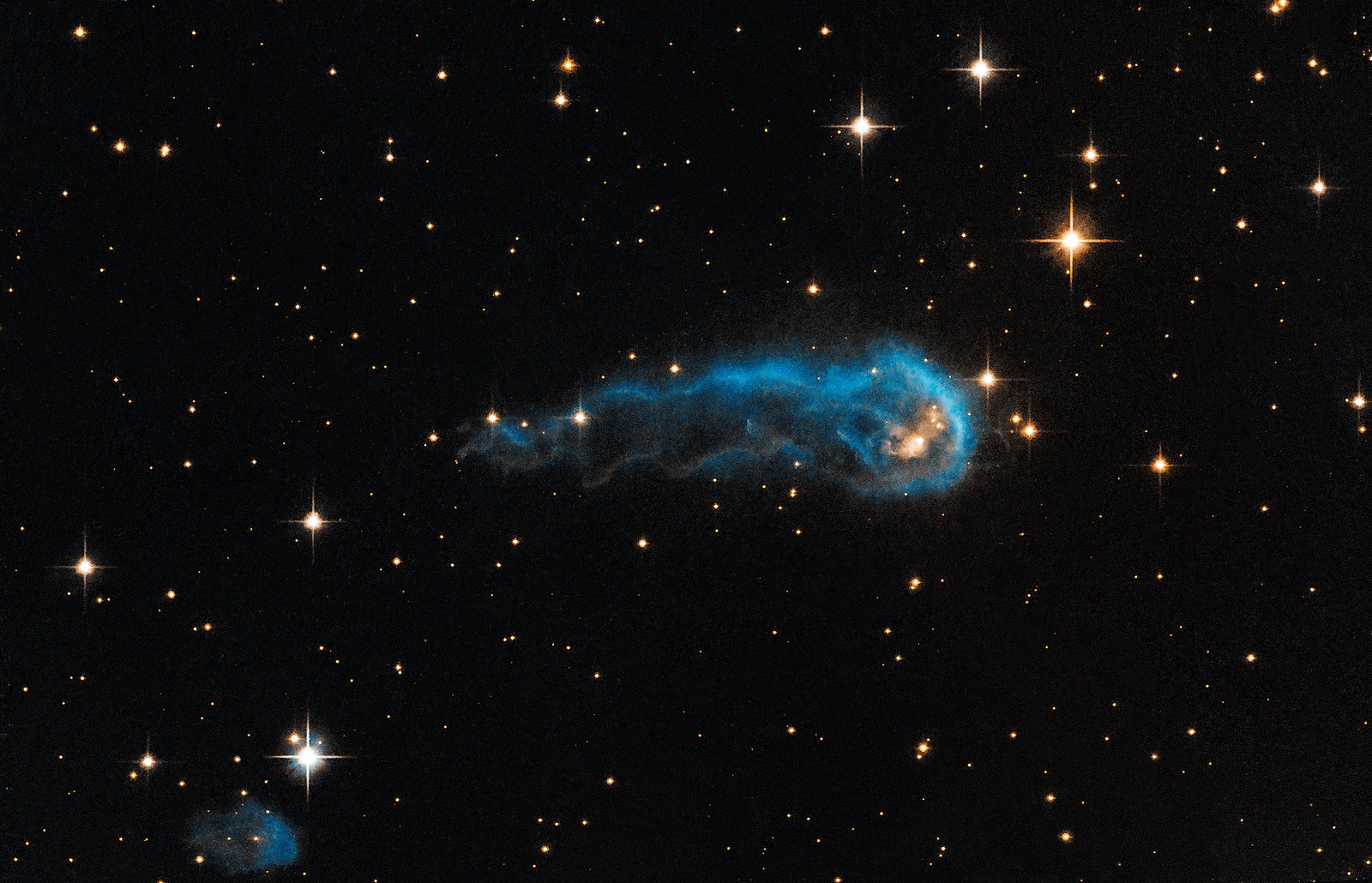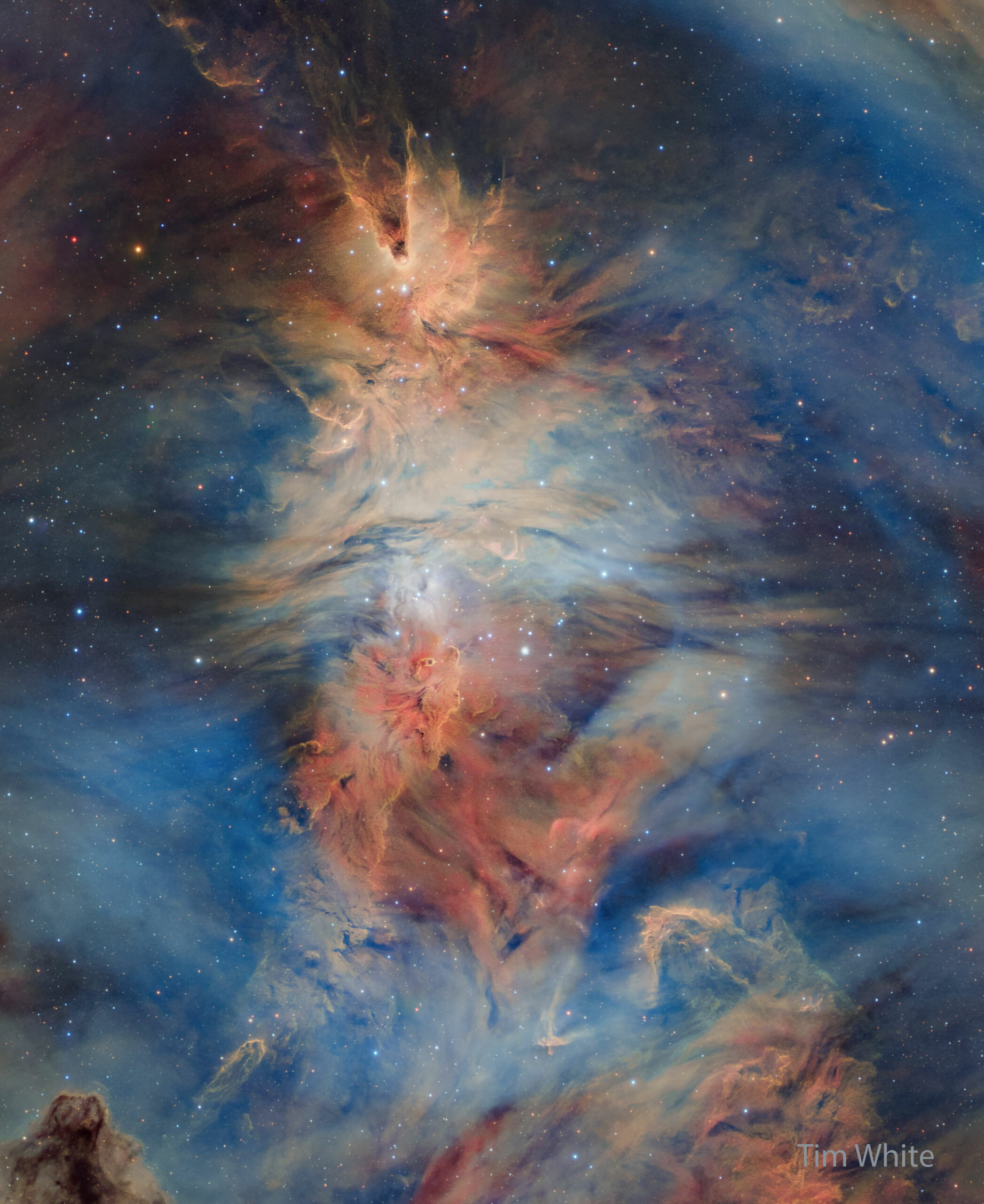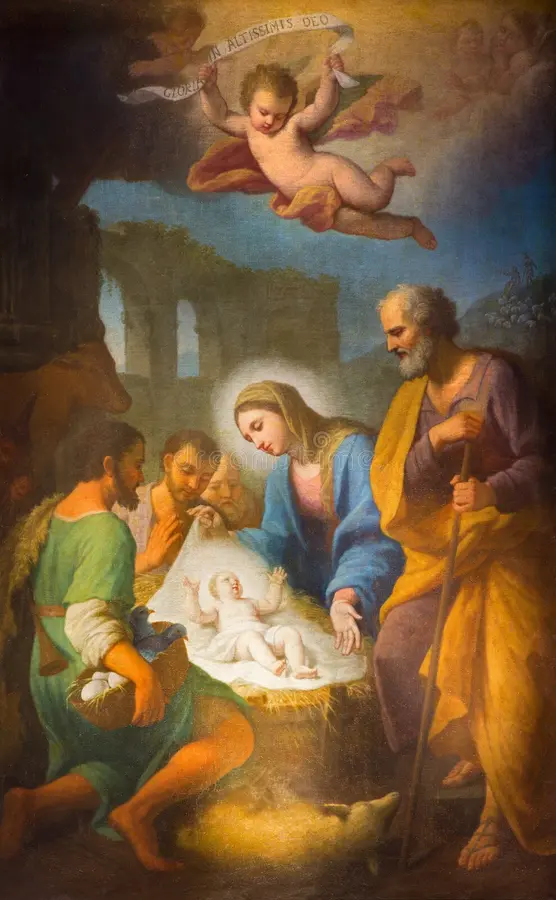Blog
Erev Shabbat Service and Chanukah Candle Lighting Friday December 27th 2024 550pm music with Inbal Sharett-Singer, Jayson Rodovsky, Jeff Bailey, Peter Whitman and mick laBriola.
more...This light-year-long knot of interstellar gas and dust resembles a caterpillar on its way to a feast. But the meat of the story is not only what this cosmic caterpillar eats for lunch, but also what’s eating it. Harsh winds from extremely bright stars are blasting ultraviolet radiation at this “wanna-be” star and sculpting the gas and dust into its long shape.
The culprits are 65 of the hottest, brightest known stars, classified as O-type stars, located 15 light-years away from the knot, towards the right edge of the image. These stars, along with 500 less bright, but still highly luminous, B-type stars make up what is called the Cygnus OB2 association. Collectively, the association is thought to have a mass more than 30 000 times that of our Sun.
The caterpillar-shaped knot, called IRAS 20324+4057, is a protostar in a very early evolutionary stage. It is still in the process of collecting material from an envelope of gas surrounding it. However, that envelope is being eroded by the radiation from Cygnus OB2. Protostars in this region should eventually become young stars with final masses about one to ten times that of our Sun, but if the eroding radiation from the nearby bright stars destroys the gas envelope before the protostars finish collecting mass, their final masses may be reduced.
Spectroscopic observations of the central star within IRAS 20324+4057 show that it is still collecting material quite heavily from its outer envelope, hoping to bulk up. Only time will tell if the formed star will be a “heavy-weight” or a “light-weight” with respect to its mass.

Terry John Bozzio (born December 27, 1950 San Francisco) is an American drummer best known for his work with Missing Persons, U.K., and Frank Zappa. He has been featured on nine solo or collaborative albums, 26 albums with Zappa and seven albums with Missing Persons. Bozzio has been a prolific sideman, playing on numerous releases by other artists since the mid-1970s. He was inducted into the Modern Drummer Hall of Fame in 1997.
more...Thelonious Sphere Monk III (born December 27, 1949) is an American jazz drummer, composer and bandleader. He is the son of jazz pianist Thelonious Monk. By the 1990s, Monk was ready to begin his solo career, in which he has taken a decidedly more jazz-oriented direction. For two consecutive seasons, December 1996 and January 1998, on ABC, jazz returned to network television after a twenty-five-year absence. Sponsored by Nissan and the Thelonious Monk Institute, under the guidance of Monk, a historic assemblage of artists gathered for ‘A Celebration of America’s Music’ hosted by Bill Cosby and featuring Natalie Cole, Jon Secada, Tony Bennett, k.d. lang, as well as Thelonious performing his father’s signature tune, “‘Round Midnight“, with Herbie Hancock, Pat Metheny, and Nnenna Freelon.
more...
William Orval Crow (born December 27, 1927) is an American jazz bassist. Among other work, Crow was the long-term bassist in saxophonist Gerry Mulligan‘s bands in the 1950s and 1960s.
Crow was born on December 27, 1927, in Othello, Washington, but spent his childhood in Kirkland, Washington. In fourth grade, he took up the trumpet and in the sixth grade he switched to baritone horn. He played drums in his high school swing band. He joined the Army in 1946, where he played the baritone horn in the 2nd Army Band and drums in a Service Club band. He remained in the army until 1949. After leaving the Army, he played drums and valve trombone while a student at the University of Washington.
In 1950, Crow moved to New York City, playing the valve trombone and drums. On a summer job in Tupper Lake NY at the Altamont Hotel he taught himself to play the string bass. Within two years of starting to play the bass, he played with Teddy Charles and was with Stan Getz from October 1952 to April of the following year. He joined the Claude Thornhill band for the summer of 1953, moved to the Terry Gibbs Quartet that fall, and in 1954 he moved to the Marian McPartland Trio at the Hickory House in NYC, with Joe Morello at the drums. He was the bassist with Gerry Mulligan‘s sextet and quartet during the mid to late 1950s and early 1960s. While with Mulligan, he studied the bass with Fred Zimmerman, of the New York Philharmonic. In 1956 he was with Jay and Kai (J.J. Johnson and Kai Winding) for several engagements including the Newport Jazz Festival. And in 1962 he joined the Benny Goodman band for a summer tour of the Soviet Union.
more...Compared to other toques, flamenco fandangos have a shorter rhythmic cycle that may feel more familiar to musicians trained in classical or other Western music styles. Fandangos are an early form of flamenco music, influenced from Arab-Moorish music and Portuguese fado music. Flamenco Fandangos are generally festive and upbeat.
Fandangos have a 3/4 rhythm (previously 6/8, now 3/4 or 3/8), with an accent on the first beat. Most Fandangos are very metric and appropriate for dance. A common compás that can be felt is made up of 12 beats (2×6). However, others may have more of a free-form feeling (known as en toque libre or “very freely”).
There’s also a variety of regional Fandangos, known as fandangos locales, each with their own style and character. There are many regional sub-styles that could fall into this categorization, but the most prominent include:
- Fandangos de Huelva
- Fandangos de Málaga
- Fandangos de Granada
- Fandangos de Almería
- Fandangos de Cadíz
- Fandangos de Córdoba
George Otis Winston III (February 11, 1949 – June 4, 2023) was an American pianist performing contemporary instrumental music. Best known for his solo piano recordings, Winston released his first album in 1972, and came to prominence with his 1980 album Autumn, which was followed in 1982 by Winter into Spring and December. All three became platinum-selling albums, with December becoming a triple-platinum album. A total of 16 solo albums were released, accumulating over 15 million records sold, with the 1994 album Forest earning Winston a Grammy award for Best New Age Album. Winston received four other Grammy nominations, including one for Best Children’s Music Album, performed with actress Meryl Streep, and another for Best Contemporary Instrumental Album for his interpretation of works by the rock band the Doors.
Winston played in three styles: the melodic approach that he developed and called “rural folk piano”; stride piano, primarily inspired by Fats Waller and Teddy Wilson; and his primary interest, New Orleans rhythm and blues (R&B) piano, influenced by James Booker, Professor Longhair and Henry Butler. While the majority of his recordings were in the folk piano style, Winston mostly enjoyed playing R&B piano. His musical style has been classified as new age and sometimes classical, but he rejected both labels.
Winston also played the guitar and harmonica. His interest in the Hawaiian slack-key guitar led him to start his own record label, Dancing Cat Records.
more...Viewed face-on, grand spiral galaxy NGC 5643 has a festive appearance in this colorful cosmic portrait. Some 55 million light-years distant, the galaxy extends for over 100,000 light-years, seen within the boundaries of the southern constellation Lupus. Its inner 40,000 light-years are shown in sharp detail in this composite of Hubble Space Telescope image data. The galaxy’s magnificent spiral arms wind from a yellowish central region dominated by light from old stars, while the spiral arms themselves are traced by dust lanes, young blue stars and reddish star forming regions. The bright compact core of NGC 5643 is also known as a strong emitter of radio waves and X-rays. In fact, NGC 5643 is one of the closest examples of the Seyfert class of active galaxies, where vast amounts of dust and gas are thought to be falling into a central massive black hole.

Glyn Thomas Johns (born 15 February 1942) is an English recording engineer and record producer. He has worked with many of the most famous rock recording acts from both the UK and abroad, such as the Rolling Stones, the Beatles, the Who, Led Zeppelin, the Kinks, Eagles, Bob Dylan, the Band, Eric Clapton, the Clash, Steve Miller Band, Small Faces, the Ozark Mountain Daredevils and Joan Armatrading. Throughout his career, he has generally preferred a live, natural approach to recording in the studio, and developed a method of recording drums sometimes referred to as the “Glyn Johns method“.
The years 1964–1984 marked Johns’s peak era of activity in which he engineered or produced numerous hit records. In 1965 Johns became one of the first independent British recording engineers to operate freelance rather than under the hire of a particular record label or studio. He was involved in making some of the most influential albums of the rock era such as Beggars Banquet and Let It Bleed by the Rolling Stones, Who’s Next by the Who, and Led Zeppelin’s debut album. Johns was the chief engineer during the Beatles’ Get Back sessions for what became the Let It Be album, as documented in the films Let It Be (1970) and The Beatles: Get Back (2021). Since 1984 Johns has continued to be active in the industry.
Johns is the father of Ethan Johns, and the older brother of Andy Johns (1950–2013), all three of whom shared the same career. In addition to his work as an engineer and producer, Johns has recorded as a solo musical artist. In 2012, Johns was inducted into the Rock and Roll Hall of Fame, receiving the Award for Musical Excellence.
more...William Fredrick Bean (December 26, 1933 – February 6, 2012) was an American jazz guitarist from Philadelphia.
Bean was born into a musical family in Philadelphia. His mother played the piano. His father was an amateur singer and guitarist, and his sister was a professional singer. He started on guitar at the age of twelve.
His father taught him some of the basics on guitar before he received lessons from Howard Herbert.Then he studied for about one year with Dennis Sandole. During the late 1940s and 1950s, he performed at venues in the Philadelphia area. In the mid-1950s, he moved to New York City and recorded with Charlie Ventura and Red Callender, and in 1958 he moved to Los Angeles to record for Decca. In Los Angeles, he worked with Buddy Collette, Paul Horn, John Pisano, Bud Shank, Milt Bernhart, Les Elgart, Herb Geller, Lorraine Geller, Calvin Jackson, and Zoot Sims.
more...John Scofield (born December 26, 1951 Dayton, OH) is an American guitarist and composer. His music over a long career has blended jazz, jazz fusion, funk, blues, soul and rock. He first came to mainstream attention as part of the band of Miles Davis; he has toured and recorded with many prominent jazz artists including saxophonists Eddie Harris, Dave Liebman, Joe Henderson, and Joe Lovano; keyboardists George Duke, Joey DeFrancesco, Herbie Hancock, Larry Goldings, and Robert Glasper; fellow guitarists Pat Metheny, John Abercrombie, Pat Martino, and Bill Frisell; bassists Marc Johnson and Jaco Pastorius; and drummers Billy Cobham and Dennis Chambers. Outside the world of jazz, he has collaborated with Phil Lesh, Mavis Staples, John Mayer, Medeski Martin & Wood, and Gov’t Mule.
more...Considered as a star forming region and cataloged as NGC 2264, the complex jumble of cosmic gas and dust is about 2,700 light-years distant and mixes reddish emission nebulae excited by energetic light from newborn stars with dark interstellar dust clouds. The featured image spans an angle larger than a full moon, covering over 50 light-years at the distance of NGC 2264. Its cast of cosmic characters includes the Fox Fur Nebula, whose convoluted pelt lies just to the left of the image center, bright variable star S Monvisible just to the right of the Fox Fur, and the Cone Nebula near the image top. With the Cone Nebula at the peak, the shape of the general glow of the region give it the nickname of the Christmas Tree Cluster, where stars are tree ornaments.

More Posts
- Doc Cheatham Day
- World Music with Ousmane Toure
- Daily Roots with Sizzla
- Music for Surviving the Pandemic and Realizing Racial Justice
- The Cosmos with NGC 2359
- Chick Corea Day
- Marcus Belgrave Day
- Juan del Encina Day
- Flamenco Fridays with Sabicas
- Daily Roots with Anthony B
- Music for Surviving the Pandemic and Realizing Racial Justice
- The Cosmos with NGC 1300
- Jamaaladeen Tacuma Day
- Bernard Purdie
- Shelly Manne Day
- Hazel Scott Day
- Clarence Pinetop Smith Day
- World Music with Don Pío Alvarado
- Daily Roots with Slyford Walker
- Music for Surviving the Pandemic and Realizing Racial Justice




